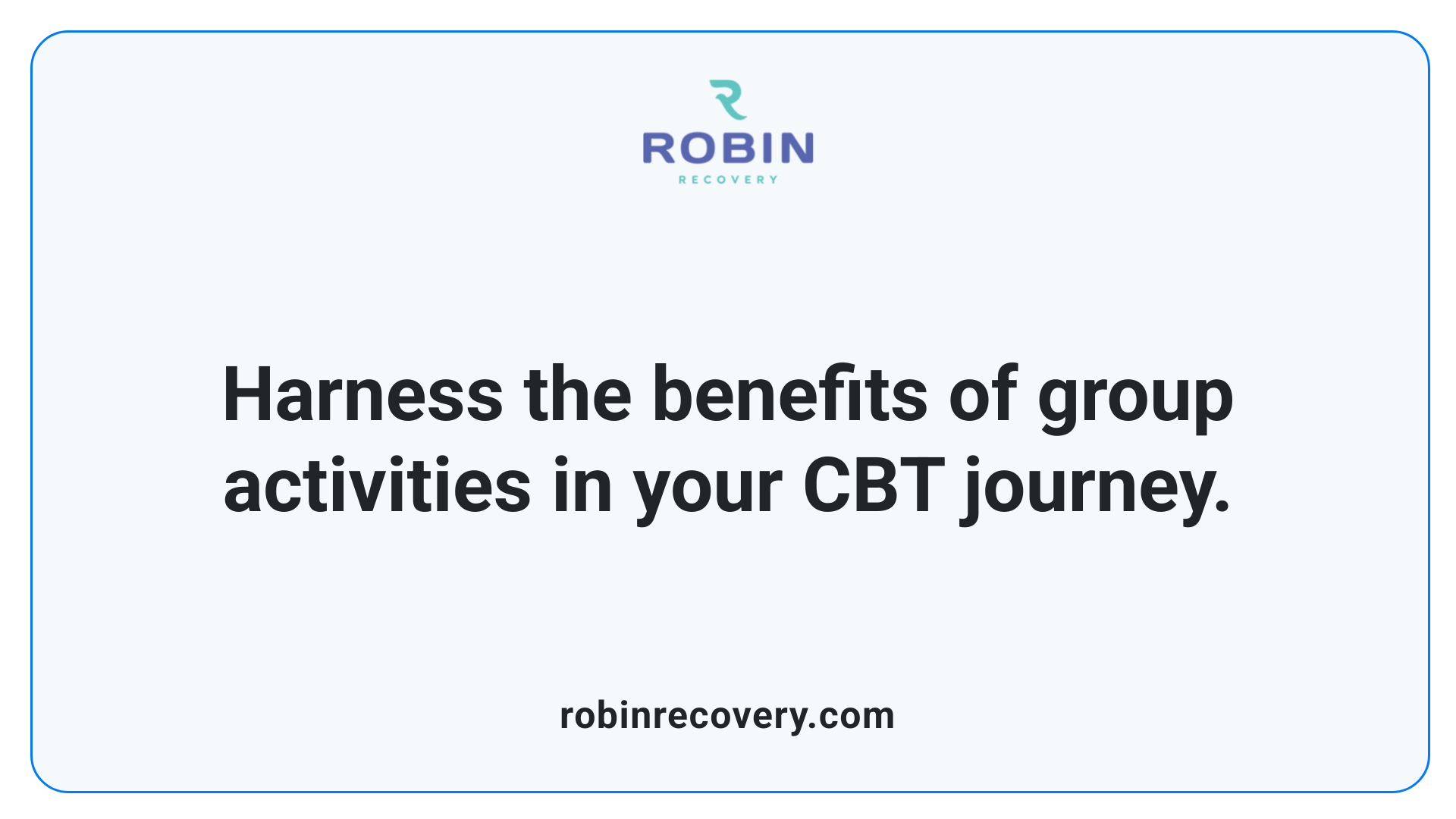How to Incorporate Cognitive-Behavioral Therapy into Your Recovery Plan

Unveiling the Power of CBT in Recovery
Cognitive Behavioral Therapy (CBT) has emerged as a cornerstone in addiction treatment, offering structured, goal-oriented techniques that address the underlying cognitive and behavioral patterns driving substance use. This article delves into the intricacies of incorporating CBT into personal recovery plans, exploring various techniques and the indispensable role of CBT in fostering long-term sobriety. Discover the principles, benefits, and practical applications of CBT, empowering individuals on their journey toward overcoming addiction.
Understanding Cognitive Behavioral Therapy (CBT) in Recovery

What is Cognitive Behavioral Therapy (CBT) in recovery?
Cognitive Behavioral Therapy (CBT) is a widely used approach in addiction treatment that focuses on the connections between thoughts, feelings, and behaviors. It equips individuals with techniques to identify and alter dysfunctional thought patterns, which are often at the root of substance use disorders. This process not only fosters healthier coping strategies but also builds resilience against relapse.
CBT operates on the principle that negative thinking can lead to emotions and behaviors that perpetuate addiction. By challenging cognitive distortions, individuals learn to recognize their triggers—such as specific thoughts, emotions, or environments—that encourage substance use. For many in recovery, clarity about these connections is a powerful step toward maintaining sobriety.
How does CBT interconnect thoughts, feelings, and behaviors?
In CBT, the relationship between thoughts, feelings, and behaviors is pivotal. When negative thoughts emerge, they often lead to emotions like anxiety or hopelessness, which can trigger substance use as a maladaptive coping mechanism. CBT encourages clients to engage in self-reflection, using tools like journaling and homework assignments to confront these automatic thoughts and their impacts.
What is the role of CBT in relapse prevention and motivation?
Relapse prevention is a critical element of CBT, involving strategies to identify high-risk situations that may provoke cravings. CBT teaches individuals to construct coping plans, equipping them with alternative responses rather than resorting to substance use.
Research shows that CBT can reduce relapse rates significantly—by up to 60% compared to traditional methods. Furthermore, by combining motivational interviewing and contingency management with CBT, patients not only improve treatment adherence but also maintain motivation for sustained recovery. This structured yet flexible therapy empowers individuals, allowing them to harness their strengths and overcome challenges in their journey toward recovery.
Exploring Effective CBT Techniques for Addiction Recovery

What are effective CBT techniques for addiction recovery?
Effective CBT techniques for addiction recovery encompass a variety of methods aimed at transforming negative thought patterns and behaviors. One of the foundational techniques is cognitive restructuring. This process involves identifying and challenging dysfunctional thoughts that can lead to substance use, helping individuals reframe their mindset to support recovery.
Another vital technique is exposure response prevention. This method focuses on helping clients face their fears and triggers in a controlled manner, reducing avoidance behaviors that often reinforce substance use.
Journaling and relaxation practices
Journaling serves as a particularly beneficial practice within CBT. It allows individuals to document their thoughts and emotions, providing insights into their triggers and emotional states throughout the recovery journey. This reflection promotes self-awareness and aids in recognizing harmful thought patterns.
Incorporating progressive muscle relaxation techniques can effectively address stress and anxiety, both of which are common triggers for relapse. These relaxation practices empower clients to cope with their emotions in a healthier way, reducing reliance on substances.
Positive CBT techniques
Moreover, several positive CBT techniques focus on clients' strengths, enhancing resilience and fostering a sense of empowerment. Encouraging individuals to set achievable goals and celebrate small successes can bolster self-esteem and affirm their commitment to sobriety.
These methods, alongside self-monitoring and mindfulness practices, contribute to a comprehensive approach for achieving long-term behavioral change, essential for lasting recovery from addiction.
The Role of CBT in Comprehensive Substance Abuse Interventions

What is the role of CBT in substance abuse interventions?
Cognitive Behavioral Therapy (CBT) is a critical part of substance abuse interventions. It provides effective strategies for treating substance use disorders, whether used alone or alongside other therapies. Studies indicate that CBT can lead to significant improvements in treatment outcomes, demonstrating moderate effect sizes in reducing substance use. This is primarily achieved by addressing cognitive and environmental triggers that lead to cravings and addictive behaviors.
How does CBT integrate with other treatment strategies?
CBT isn’t just a standalone solution. It works well when combined with other therapeutic approaches. Techniques such as:
- Motivational Interviewing (MI) - which helps resolve ambivalence toward change.
- Contingency Management (CM) - offering rewards for maintaining abstinence.
- Relapse Prevention - equipping individuals with coping plans for high-risk situations.
These methods, when integrated with CBT, enhance treatment effectiveness, creating a comprehensive recovery plan. The collaboration with support systems like family or couples therapy also enhances adherence to treatment and positive outcomes.
Is CBT covered by insurance?
CBT's significance in mental health and addiction treatment is further supported by legislative measures like the Affordable Care Act. This law mandates insurance coverage for mental health services, ensuring that CBT is accessible to individuals seeking help for substance use disorders. This coverage allows more individuals to benefit from CBT, reinforcing its integral role in recovery.
Harnessing the Power of CBT Group Activities in Treatment

How can CBT group activities be used in substance abuse treatment?
CBT group activities significantly enhance substance abuse treatment by fostering accountability, self-examination, and group cohesion among participants. These activities create a supportive environment where clients can engage with one another and share their experiences.
Benefits of Group Activities
Group activities in CBT support individualized recovery paths while cultivating community. Here are some benefits:
- Accountability: Participants hold each other accountable for their recovery goals.
- Shared Knowledge: Individuals can learn from the successes and struggles of their peers.
- Enhanced Motivation: Sharing personal narratives instills hope and encourages commitment to the treatment process.
Role-Playing and Interactive Workshops
Role-playing is an essential component of CBT group work. Clients can practice refusal skills in real-life scenarios, helping to build resilience against triggers. Interactive workshops may include:
- Identifying Personal Triggers: Clients learn how to spot their specific triggers and develop tailored coping strategies.
- Relaxation Techniques: Practicing mindfulness and relaxation exercises in a group setting reinforces these skills.
- Educational Games: Utilizing forms like Kahoot can make learning enjoyable while teaching vital strategies in an interactive manner.
Shared Experiences and Motivation
Discussions in group settings allow individuals to share personal challenges and milestones. This sharing helps:
- Foster Connection: Participants feel less isolated in their struggles, knowing they are not alone.
- Reflect on Progress: Regular check-ins provide opportunities to assess how far they've come and adjust goals as necessary.
Overall, structured CBT group activities enhance social support, provide practical skills, and nurture emotional resilience, making the recovery process more effective.
Examples of CBT Coping Skills for Behavioral Health

What are some CBT coping skills examples for behavioral health?
Cognitive Behavioral Therapy (CBT) offers several effective coping skills for behavioral health, especially for managing anxiety and depression. Utilizing these techniques can significantly enhance emotional regulation and overall mental health.
Diaphragmatic Breathing and Relaxation Techniques
Diaphragmatic breathing is a simple yet powerful tool to help promote relaxation. By focusing on deep, abdominal breathing, individuals can lower stress levels and reduce anxiety. Progressive Muscle Relaxation (PMR) complements this by systematically tensing and then relaxing different muscle groups, fostering a deeper sense of calm.
Behavioral Activation and Cognitive Restructuring
Behavioral activation encourages individuals to engage in enjoyable or rewarding activities, which can uplift mood and distract from negative thoughts. This proactive approach counteracts the tendency to withdraw during low phases. Meanwhile, cognitive restructuring involves identifying negative thought patterns and actively challenging them, enabling healthier perspectives and reducing feelings of hopelessness.
SMART Goals for Mental Health Management
Setting SMART (Specific, Measurable, Achievable, Relevant, Time-bound) goals provides clarity and direction in managing mental health challenges. This structured approach can help individuals focus their efforts, monitor progress, and maintain motivation throughout their recovery journey.
CBT Techniques Description Benefits Diaphragmatic Breathing Deep, abdominal breathing to promote relaxation and reduce tension Lowers stress; enhances calmness Progressive Muscle Relaxation Gradual tensing and relaxing of muscles for physical and mental relaxation Fosters deeper relaxation Behavioral Activation Engaging in rewarding activities to combat low mood Uplifts mood; distracts from negativity Cognitive Restructuring Challenging and changing negative thought patterns Improves emotional well-being SMART Goals Setting structured, achievable goals for mental health management Provides focus; aids in motivation
Incorporating these skills into daily routines allows individuals to better manage their mental health and reinforces the principles of CBT in their recovery process.
Mastering the 3 C's of Cognitive Behavioral Therapy
What are the 3 C's of cognitive behavioral therapy?
The 3 C's of cognitive behavioral therapy (CBT) are "Catch it, Check it, Change it." This structured approach empowers individuals to tackle negative thought patterns, especially during addiction recovery.
- Catch it: The first step involves recognizing negative or unhelpful thoughts as they emerge. These thoughts often contribute to maladaptive behaviors and can trigger substance use.
- Check it: Next, individuals evaluate the validity of these thoughts. This involves questioning their accuracy and examining the evidence that supports or contradicts these thoughts.
- Change it: Finally, this step focuses on reframing or altering thoughts to adopt more positive or realistic perspectives. By changing the narrative surrounding their thoughts, individuals can better manage their emotions and behaviors.
Importance of reframing negative thoughts
Reframing negative thoughts is crucial in addiction recovery, as it helps break the cycle of harmful thought patterns. By identifying cognitive distortions, individuals can challenge beliefs that exacerbate feelings of hopelessness. This can improve self-esteem and reduce the likelihood of relapse.
Impact on mental health outcomes
Employing the 3 C's can substantially enhance mental health outcomes. Engaging in this process fosters self-awareness and equips individuals with practical coping strategies. The ability to manage thoughts effectively leads to enhanced emotional regulation, promotes resilience, and supports long-term sobriety.
Embrace the Transformative Potential of CBT
Cognitive Behavioral Therapy offers a dynamic and practical approach to overcoming addiction, providing tools and strategies to change thought patterns and behaviors that sustain long-term recovery. By incorporating CBT into your recovery plan, you can unlock the potential for significant personal growth and a stronger, healthier lifestyle. Whether through individual sessions, group activities, or daily practice, CBT encourages empowerment and resilience, making it an invaluable component of any addiction treatment program. Embrace the journey with CBT and take the first step towards lasting change.
References
- CBT Techniques to Promote a Lasting Recovery | Waypoint
- Proven CBT Techniques for Addiction Recovery Success
- Useful CBT Techniques for Recovery | Benefits of Mental Health
- Cognitive-Behavioral Therapy for Substance Use Disorders - PMC
- Cognitive Behavioral Therapy for Relapse Prevention
- Cognitive Behavioral Therapy (CBT) - Avery Lane
- Cognitive Behavioral Therapy (CBT): What It Is & Techniques
- The Importance of Cognitive Behavioral Therapy for Addiction
